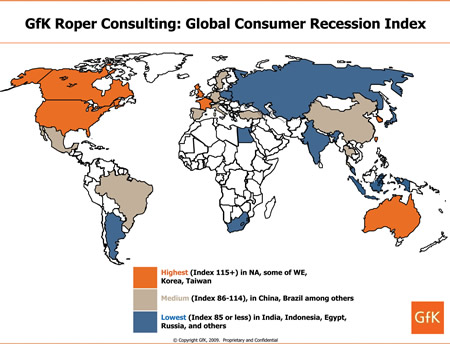« Microsoft Introduces New Search Engine: BING | Main | U.S. Chamber of Commerce to Monitor GM and Chrysler Restructuring »
June 2, 2009
Global Consumer Recession Index Reveals Most and Least Affected Countries
U.S.A. is among the most impacted nations worldwide.

GfK Roper Consulting, a division of GfK Custom Research North America, today announced highlights from its first Global Consumer Recession Index, ranking the impact of the economic climate on individuals worldwide based on their level of concern, distress and reaction.
Segmenting the countries by high, medium and low impact, the Index reveals consumers in U.S., Taiwan, Canada, Korea, the UK, France and Australia are feeling most affected. Comparatively, India, Japan, Russia, Argentina, South Africa and Argentina all landed low on the impact scale.
"What's clear is that the global recession is not equally distributed," explains Nick Chiarelli, Director of Consumer Trends, GfK Roper Consulting. "To truly understand the impact of today's economic environment, it's vital to view this not as one blanket fiscal storm but rather as a series of localized recessions."
Based on GfK Roper Consulting's 2009 GfK Roper Mood of the World(R) Study, the Index was created by averaging, weighting and combining the following three measures to calculate an overall score in terms of how consumers are feeling:
• Concern - Respondents list their top-three worries from a selection of 21 economic, social and political issues. "Recession" ranked as the top concern globally. Regarding the highest levels of economic concern, Asian consumers topped the list while the U.S. landed in 15th place just behind its northern neighbor Canada (14th).
• Distress - Consumers indicate which positive and negative financial-related events they've experienced from a list of eight. Globally, 62% say they faced a negative event (e.g. losing their job or having difficulty paying their bills) in the past 12 months and the U.S. clocked in higher at 77% with Canada not far behind at 72%. Americans are also among the most distressed, following only Turkey.
• Reaction - Participants report where they've cut back from a list of 26 items and activities as well as which of 10 money-saving strategies they've employed. Consumers in English-speaking nations such as the U.S., Australia, Canada and the UK are the most likely to be doing things to cut back and save money.
Worldwide, the top cutback area is "dining out", whereas "shopping more carefully for everyday items" is the top-ranked money-saving strategy. Among Americans and Canadians, "dining out" also ranked first in cutbacks while the number one strategy for saving cash is using coupons.
"Localized marketing efforts are absolutely essential in this environment of cautious spending. Companies will benefit most by tailoring their strategies to address the concerns driving consumer behavior as they vary across several regions.", concludes GfK's Nick Chiarelli.
Source: GfK Roper Consulting
|GlobalGiants.com|







Edited & Posted by the Editor | 9:22 AM | Link to this Post







